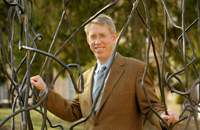by Laura Sutton
photos by Lee Thomas and Brian Connors Manke
“It’s necessary for human beings to establish laws for themselves and live according to laws, or they differ in no way from the beasts that are the most savage in every way.”
(874e-875a, tr. Thomas Pangle).
In Plato’s “Laws,” the philosopher sketches the basic political structure and laws for a proposed colony in Crete. During the Workshop on Plato’s Laws participants will concern themselves with engagement in a similar political community. The anticipated event takes place at the University of Kentucky on March 26-28, 2009.
While conference-goers won’t be founding a city as happens in the “Laws,” the group will be undergoing some of the same processes by creating standards, norms and rules of how to talk to each other about the work, says Eric Sanday, assistant professor in the UK Department of Philosophy and co-director of the conference.
Although modern political life is too often concerned with factional divisions, Sanday says it is important to remember that there is an essential philosophical component to political life, one that asks the enduring question that launched Socrates: “Who are you?” By asking this question in a serious, rigorous, disciplined way — in this case, specifically and explicitly political — and by convening an extended meditation on such ideals as justice, freedom and virtue, the conference is contributing to the larger political life of the country.
While not as widely-read or studied as Plato’s “Republic,” the “Laws” have gained currency in recent years as an overlooked but important work that merits further attention.
The conference, sponsored by the College of Arts & Sciences, the Department of Philosophy and the Department of Modern and Classical Languages, Literatures and Cultures, will attract an audience of highly-interested scholars and graduate students, and the proceedings are sure to have an impact well beyond campus. For the UK Department of Philosophy, hosting the event will enhance the program’s already strong reputation, according to Sanday. “This will no doubt raise the profile of the department and its graduate program,” he said.
Participants include prominent international names in philosophy, classics and political science from such prestigious institutions as Vassar College, University of Windsor, University of Ottawa, University of Guelph (where is this?), Boston University, Boston College, University of Colorado at Denver, and Notre Dame University. The conference, which was conceived of and is co-directed by Sanday and his colleague Greg Recco of St. John’s College, Annapolis, is sponsored by the UK College of Arts and Sciences and the Department of Philosophy.
 Eric Sanday, assistant professor in the UK Department of Philosophy and co-director of the conference
Eric Sanday, assistant professor in the UK Department of Philosophy and co-director of the conference
The event promises to be intense, rigorous, and profoundly stimulating for those in attendance. “Remarkable,” is how Eric Sanday describes the gathering, which includes 14 papers covering each of the “Laws” in order, plus providing context for the discussions. “Participants will want to see everything and contribute or be on hand for every development,” Sanday predicted.
The scholarly significance of the workshop is that the weekend will provide established scholars with valuable insight into Plato’s political philosophy, give up-and-coming scholars avenues in to the discussions of foundational philosophical issues, and offer undergraduates a sense of the range of interpretive approaches to ancient philosophy. Several scholarly papers and perhaps a published volume of the conference proceedings will be among the tangible results of the weekend.
The conference is also unique in that it presents a chance for students at all levels to witness the profession of philosophy as it is being practiced today in the United States. Participants will include scholars and graduate students in philosophy, political science, classics, and law representing a number of research institutions. Several philosophy graduate students from UK who spent the fall semester studying the “Laws” will be on hand to continue their in-depth study of the work.
